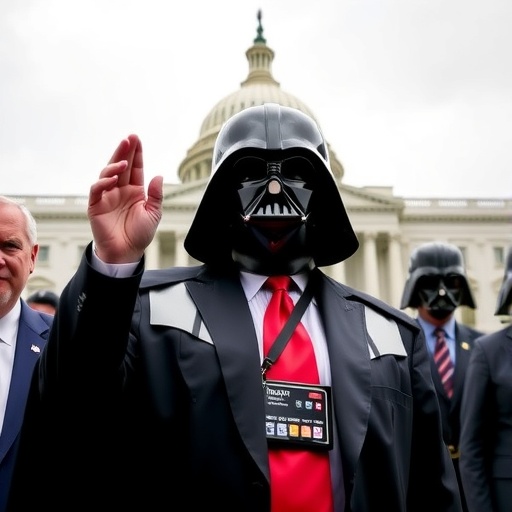Senate Democrats Reject GOP Reopening Bills as Trump Hails ‘Darth Vader’ Budget Chief and Permanent Cuts to Key Programs
In a escalating political standoff that has gripped Washington, Senate Democrats have stonewalled multiple GOP-led bills aimed at ending the ongoing government shutdown, even as President Donald Trump celebrated the appointment of budget director Russ Vought by dubbing him ‘Darth Vader’ and vowing to slash Democratic priorities forever. This dramatic clash unfolded on the Senate floor, where Democrats’ repeated ‘no’ votes have prolonged the crisis affecting millions of federal workers and essential services, highlighting deep divisions over border security and spending.
- Trump’s ‘Darth Vader’ Nickname for Russ Vought Ignites Senate Firestorm
- Senate Democrats’ Firm Stance: No Votes on GOP Shutdown-Ending Measures
- Unpacking Trump’s Boast: Which Democratic Priorities Face Permanent Elimination?
- GOP Lawmakers Push Back Amid Mounting Frustrations in the Shutdown Saga
- Path Forward: Potential Breakthroughs and Lingering Risks in the Budget Battle
The shutdown, now in its third week, stems from Trump’s insistence on $5.7 billion for a border wall, a demand Democrats view as non-negotiable. But the latest developments have injected a layer of personal animosity and bold rhetoric, with Trump boasting during a White House event that certain budget cuts under Vought’s leadership would ensure Democratic-favored programs ‘never come back.’ This provocative stance has only hardened positions on both sides, turning what was already a tense negotiation into a full-blown partisan battle.
Trump’s ‘Darth Vader’ Nickname for Russ Vought Ignites Senate Firestorm
President Trump’s introduction of Russ Vought as the new director of the Office of Management and Budget (OMB) took a theatrical turn when he likened the official to the infamous Star Wars villain ‘Darth Vader.’ Speaking at a cabinet meeting, Trump praised Vought’s tough approach to federal spending, saying, ‘Russ is going to be like Darth Vader – he’s going to come in and straighten things out.’ The comment, intended as a nod to Vought’s reputation for fiscal conservatism, drew immediate backlash from Democrats, who saw it as a mocking dismissal of their legislative priorities.
Russ Vought, a veteran of conservative think tanks like the Heritage Foundation and a key architect of Trump’s budget proposals, has long advocated for significant reductions in non-defense spending. His confirmation earlier this year was contentious, with Senate Democrats voting 50-47 against him, citing concerns over his views on entitlement programs. Now, in the midst of the shutdown, Vought’s role has become central to the GOP’s strategy. Trump elaborated on the nickname, adding, ‘He’s going to cut the fat, and some of those programs the Democrats love? They’re gone for good.’ This rhetoric has fueled accusations that the administration is using the shutdown as leverage to enact sweeping budget cuts without congressional oversight.
Democratic leaders were quick to condemn the remarks. Senate Minority Leader Chuck Schumer (D-NY) took to the floor, stating, ‘Comparing a budget enforcer to a dark lord of the Sith isn’t just childish – it’s a warning of the austerity measures this administration wants to impose on working families.’ The ‘Darth Vader’ label has since become a viral meme on social media, with critics using it to symbolize the perceived threat to social safety nets like Medicaid and food assistance programs.
Behind the scenes, Vought has been briefing GOP lawmakers on contingency plans that include permanent eliminations of certain funding streams. Sources familiar with the discussions, speaking on condition of anonymity, revealed that these plans target over $100 billion in annual spending, including environmental protections and education initiatives – areas where Democrats hold sway. This has only intensified the political standoff, as Democrats argue that reopening the government must precede any talks on budget reforms.
Senate Democrats’ Firm Stance: No Votes on GOP Shutdown-Ending Measures
Twice in the past 48 hours, Senate Democrats have voted down Republican-sponsored legislation designed to reopen the government without addressing the border wall funding. The first bill, introduced by Senate Majority Leader Mitch McConnell (R-KY), proposed a short-term funding extension through March, but it failed 53-47 along party lines. A second attempt, which included minor concessions on disaster relief, met the same fate, with all Democrats present casting ‘no’ votes.
Senator Patty Murray (D-WA), a senior member of the Appropriations Committee, explained the blockade: ‘We won’t vote to reopen the government on a piecemeal basis while the president threatens to hold the American people hostage for his vanity project.’ This unified front among Senate Democrats reflects a calculated strategy to force negotiations on broader issues, including DACA protections and increased border security without a wall.
The votes have had immediate repercussions. Over 800,000 federal employees remain furloughed or working without pay, including TSA agents at airports and national park rangers. The economic toll is mounting: the Congressional Budget Office estimates the shutdown could cost the U.S. economy up to $1.5 billion per week in lost productivity. In a letter to colleagues, Senator Elizabeth Warren (D-MA) highlighted the human impact, writing, ‘Families are skipping meals, delaying medical care – this isn’t governance; it’s cruelty amplified by the GOP’s inaction.’
From the GOP perspective, the Democrats’ refusals are seen as obstructionism. Senator Lindsey Graham (R-SC), a Trump ally, accused Democrats of playing politics: ‘They’re willing to let the government grind to a halt just to spite the president. It’s time to end this charade.’ Yet, internal GOP divisions are surfacing, with moderate Republicans like Senator Susan Collins (R-ME) urging compromise to avoid further damage.
Polling data underscores the stakes. A recent Quinnipiac University survey shows 49% of Americans blame Trump for the shutdown, compared to 32% pointing to Democrats. This public sentiment is pressuring both parties, but Senate Democrats appear resolute, tying their votes to guarantees against unilateral budget cuts.
Unpacking Trump’s Boast: Which Democratic Priorities Face Permanent Elimination?
At the heart of the controversy are Trump’s declarations that certain Democratic-backed programs will face irreversible budget cuts under Russ Vought’s oversight. During the same event where he introduced Vought, Trump singled out ‘wasteful green energy subsidies’ and ‘overbloated education grants,’ claiming, ‘These things are never coming back – we’ve got a Vader in charge now.’ This isn’t mere bluster; leaked OMB documents suggest proposals to defund the Corporation for Public Broadcasting by 50% and eliminate the National Endowment for the Arts entirely.
Delving deeper, Vought’s blueprint aligns with Project 2025, a conservative roadmap that calls for $2 trillion in spending reductions over a decade. Key targets include:
- Healthcare Access Programs: Cuts to community health centers, potentially affecting 28 million low-income patients, as outlined in the FY2020 budget request.
- Environmental Initiatives: Elimination of $4 billion in clean energy research, redirecting funds to fossil fuel incentives.
- Social Services: Reductions in SNAP (food stamps) by 20%, impacting 40 million recipients, justified as curbing ‘dependency.’
Democrats have decried these as an assault on vulnerable populations. Representative Alexandria Ocasio-Cortez (D-NY), though not in the Senate, echoed the sentiment on Twitter: ‘Trump’s ‘Darth Vader’ is code for dismantling the progress we’ve fought for. We won’t let shutdown chaos hide these attacks.’ Historical context adds weight: Similar cuts proposed in 2017 were blocked by bipartisan coalitions, but the current political standoff has eroded such alliances.
Economists warn of ripple effects. A report from the Center on Budget and Policy Priorities projects that these budget cuts could increase poverty rates by 2-3% nationwide. GOP defenders, including House Speaker Paul Ryan at the time, argued that fiscal responsibility demands tough choices, but critics counter that the shutdown itself is the real budgetary black hole, with costs already exceeding $11 billion.
Vought himself has remained stoic, telling reporters, ‘My job is to ensure taxpayer dollars are spent wisely, not to play favorites.’ Yet, his past writings, including a 2010 piece advocating for ‘dramatic restructuring’ of entitlements, have Democrats on high alert.
GOP Lawmakers Push Back Amid Mounting Frustrations in the Shutdown Saga
The GOP‘s frustration with Senate Democrats‘ intransigence is palpable, as evidenced by a series of closed-door meetings on Capitol Hill. Senate Majority Whip John Thune (R-SD) described the atmosphere as ‘tense but determined,’ revealing that Republicans are considering procedural maneuvers to force a vote without Democratic support. ‘We’ve offered clean bills to reopen – their refusals are extending the pain,’ Thune said in an interview.
Within the GOP ranks, there’s a growing push for concessions. Senator Lamar Alexander (R-TN), chair of the Health Committee, proposed a bipartisan package including $1.375 billion for border barriers – far short of Trump’s ask – paired with reopening funds. However, hardliners like Senator Ted Cruz (R-TX) have dismissed it, aligning with Trump’s all-or-nothing approach.
The shutdown’s broader impacts are amplifying GOP concerns. Coast Guard families, for instance, have relied on food pantries after missing paychecks, prompting Admiral Karl Schultz to write an open letter: ‘We stand ready, but the uncertainty is taking a toll.’ Air traffic controllers have issued warnings of potential safety risks due to staffing shortages, with the FAA reporting a 10% increase in flight delays.
Internationally, the impasse is damaging U.S. credibility. During a G20 summit sidebar, foreign leaders reportedly questioned American stability, while stock markets have dipped 1.2% amid fears of prolonged uncertainty. GOP strategists are now gaming out scenarios: If the shutdown drags into February, midterm election messaging could shift, with Democrats portraying Republicans as the party of chaos.
Despite the pressure, Trump has doubled down, tweeting, ‘Democrats want open borders – we’re fighting for security. Vought will make sure we win the budget war too.’ This blend of national security and fiscal hawkishness is rallying the GOP base, even as polls show eroding support among independents.
Path Forward: Potential Breakthroughs and Lingering Risks in the Budget Battle
As the political standoff persists, glimmers of negotiation are emerging. House Democrats, led by Speaker Nancy Pelosi, have invited Trump for talks, proposing a ‘clean’ reopening bill with separate border security discussions. Senate negotiations, mediated by Vice President Mike Pence, could yield a compromise by week’s end, potentially including $2 billion for technology-based border enhancements instead of a wall.
Yet, risks abound. If budget cuts become the flashpoint, Vought’s role will be pivotal. Analysts predict that any deal might include a spending cap agreement, averting deeper slashes but locking in modest reductions. The Bipartisan Policy Center forecasts that resolving the shutdown could boost GDP by 0.2% in Q1 2019, underscoring the urgency.
Looking ahead, this episode foreshadows the 2020 budget cycle. With Russ Vought at the helm, expect intensified debates over entitlements as the national debt surpasses $22 trillion. Democrats are already mobilizing, with plans for oversight hearings on OMB practices. For federal workers and the public, the message is clear: Relief hinges on bridging the divide between Trump’s vision and Democratic defenses.
In the end, the ‘Darth Vader’ saga and voting blocs reveal a Congress at a crossroads, where fiscal ideology clashes with humanitarian needs. As lawmakers reconvene, the nation watches – and waits – for a resolution that could redefine governance in an era of polarization.








